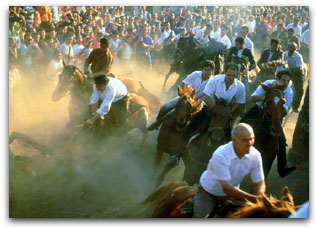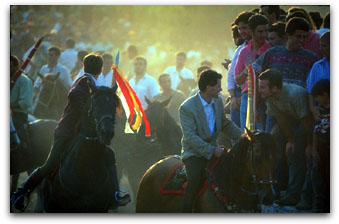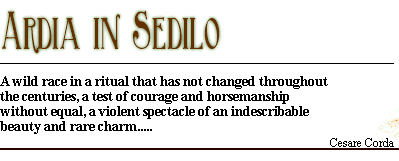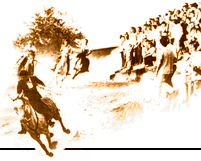Once upon a time.... this is how
every fable and story begins. These stories which spring not from events that really happened
but come from tales of epic deeds that even if they are not supported by documents or rigorous
historical evidence, are fed by people's fantasy and handed down, in the oral tradition, from
generation to generation, becoming in the popular imagination legends. Consequently, half way
between sacred and profane, these "sagre" grow as authentic festivals of the people who want
to believe and remember these mythical heroes, ascribing to them supernatural abilities and
moreover divine investitures which of course never existed.
Sardinia has many of these legends. One of them however is particularly loved by the
Sardinian people.
|
 |
|
We are in Sedilo, a village of 3000
inhabitants in the province of Oristano, in the centre of Sardinia. It is situated at an altitude of
288 metres, on the last sweep of the wide tableland which extends from the slopes of Marghine
to the river Tirso. To the north of the village a megalithic bastion called "Nurake" can be still
seen. There was probably a real nuraghic village, dating from 3500 BC on this site. The
economy of the village is based on sheep shepherding.
|
It is easy to reach Sedilo by car. It
is off the 131 Abbasanta-Nuoro main road, a few kilometres from Abbasanta.
In this village the most loved, if not the most important "sagra" takes place every year. The
"L'Ardia di San Costantino" festival.
The name "Ardia" comes from the "logudorese" dialect verb "bardiare" (to keep watch, protect,
to guard).
|
Between the 5th and 7th of July
every year about hundred of the most capable, daring and brave horsemen in the village take
part in this wild and frantic race. They do not do it for money or to win prizes but for their
devotion to a saint-warrior, who is not really a saint ...but he has been elected to that "status"
by the people, because of the feats attributed to him as a brave warrior, ready to fight for the
rights of the weakest people. He is called Santu Antine (San Costantino).
|
|
 |
|



